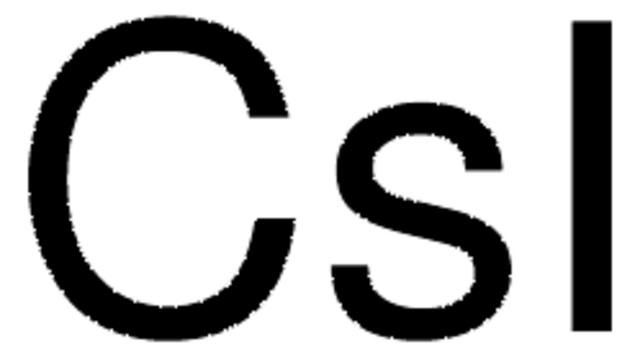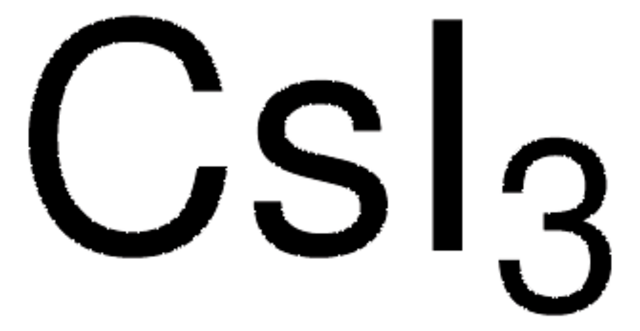429384
Cesium iodide
AnhydroBeads™, −10 mesh, 99.999% trace metals basis
Synonym(s):
Cesium monoiodide
About This Item
Recommended Products
product line
AnhydroBeads™
Quality Level
Assay
99.999% trace metals basis
form
beads
impurities
≤15.0 ppm Trace Metal Analysis
particle size
−10 mesh
mp
626 °C (lit.)
density
4.51 g/mL at 25 °C (lit.)
SMILES string
[I-].[Cs+]
InChI
1S/Cs.HI/h;1H/q+1;/p-1
InChI key
XQPRBTXUXXVTKB-UHFFFAOYSA-M
Looking for similar products? Visit Product Comparison Guide
Application
- Fabrication of Nanoscale Cesium Iodide Scintillators: This research focuses on the development of nanoscale cesium iodide scintillators for high-energy radiation detection, relevant for material scientists working on advanced detection technologies (CY Chen, CW Hun, SF Chen, CC Chen, 2015).
- Photoemission and Optical Constant Measurements: Research on the photoemission and optical properties of a cesium iodide thin film photocathode, relevant for understanding light-matter interactions in material science (R Rai, N Gupta, NFA Jammal, BK Singh, 2015).
Features and Benefits
Legal Information
Not finding the right product?
Try our Product Selector Tool.
accessory
Signal Word
Warning
Hazard Statements
Precautionary Statements
Hazard Classifications
Aquatic Acute 1 - Repr. 2
Storage Class Code
13 - Non Combustible Solids
WGK
WGK 2
Flash Point(F)
Not applicable
Flash Point(C)
Not applicable
Personal Protective Equipment
Choose from one of the most recent versions:
Certificates of Analysis (COA)
Don't see the Right Version?
If you require a particular version, you can look up a specific certificate by the Lot or Batch number.
Already Own This Product?
Find documentation for the products that you have recently purchased in the Document Library.
Customers Also Viewed
Articles
Colloidal quantum dots (CQDs) are semiconducting crystals of only a few nanometers (ca. 2–12 nm) coated with ligand/surfactant molecules to help prevent agglomeration.
Our team of scientists has experience in all areas of research including Life Science, Material Science, Chemical Synthesis, Chromatography, Analytical and many others.
Contact Technical Service









![[6,6]-Phenyl C61 butyric acid methyl ester >99.9%](/deepweb/assets/sigmaaldrich/product/structures/359/221/d990c746-0960-4c69-bf76-fe09b193824d/640/d990c746-0960-4c69-bf76-fe09b193824d.png)





